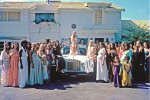It was the early 1970s and Woodstock was over.
The Beatles had traveled to India and received the teachings of a yogi, and to many hippies who were just set adrift after the decade of free love and uninhibited passion, spiritual guidance became a refuge and a sense of purpose.
“The Source Family” chronicles the lives of the members of a cult founded around one man, Jim Baker, who formed his family on the ideals of love and meditation, and who had apparently killed a few men with his bare hands in his youth, and may or may not have earned his fortune from robbing banks. It was a time when free love still reigned and the phrase “far out” was used non-ironically.
The documentary gives great insight into the Los Angeles of the 1970s, which still had the clingings of hippie culture but was newly tainted with things like the Manson murders, casting the free-loving, hedonistic ideals in a dark light.
It’s wonderful to see a documentary about the city you live in and, in a way, “The Source Family” is just as much about Los Angeles as it is about the family itself. While watching, it is easy to feel mixed feelings toward the depicted L.A. It allowed for a relatively free lifestyle, but definitely has a dark side – something that mirrors “The Source Family” well.
The practices of “The Source Family” were strange. Some of the things the interviewees claimed they witnessed sound horrible: forced polygamy and allegations of statutory rape, for example. Other things didn’t seem so bad, like morning yoga, the experimental rock band they formed and the mandatory daily toke of the “sacred herb.”
Of course, this being Hollywood, one of the young members of “The Source Family” was a camerawoman, and so she was appointed family historian.
The result is a gratifyingly complete picture of this odd commune, with incredible photos and video footage of some amazing moments, including the natural birth of a child in the family’s living room, and pictures of the Source family band playing at the base of Janss Steps here at UCLA.
The use of pictures and archival footage is done well, with camerawork reminiscent of Ken Burns. But it at times resembled a documentary made for PBS, which is not to say it’s not well done, but perhaps not strong enough to be a feature-length movie.
While the documentary is good, one gets the sense it could be better. It lacks the edge that a movie about these sorts of people ought to have. The movie itself is a little too formulaic, like a PBS documentary.
It was about the third time Sunflower was waxing poetic about Father Yod that it became a little repetitive, and the film continued this trend of repetitiveness throughout. Not enough to make this documentary bad, but certainly enough to keep it from being truly great. The problem is it lacks a certain creativity. The documentary ironically does not match the wild oddness of the family itself.
Still, the film is an interesting look at the city we live in during the 1970s, and the dynamics of a society with a lot of young people looking for a father figure and a place to belong. Something audiences can still relate to today.
